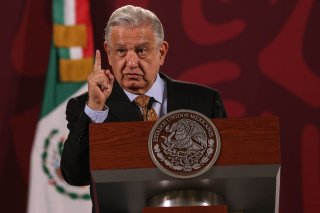Latin American Courts Under Pressure from Populist Presidents
At a time when democratic governance in the region seems wobbly, confrontations between populist presidents and judicial authorities are becoming sharper and more frequent.
Throughout all of this, her favored term has been “lawfare,” as she accuses the courts of waging a campaign against her as part of a broad opposition effort to destroy her politically, asserting that there is a “judicial party” that wants her “as a prisoner or dead.” For his part, current President Fernández, who had been handpicked by her as her successor, but who has his own ambitions for re-election, has been compelled to support her various claims, although as a former law professor, he almost certainly knows better. Supreme Court chief judge Horacio Rosatti has tried to shrug off the attacks, noting that after every court decision one party is unhappy.
Mexico: A Controversial Electoral Law on the Court’s Docket
A similar dynamic of a president pushing hard against the judiciary is playing out in Mexico, where Andres Manuel López Obrador (known by his initials as AMLO) has had at best a mixed relationship with Mexico’s Supreme Court. This is despite it having approved some of his key policies, which have stretched executive authority. These include the extensive use of the military in a public safety role and an increase in the state’s presence in the energy sector.
AMLO has worked hard to make sure he has as much control as possible over the judiciary. His administration’s Financial Intelligence Unit opened an investigation of Supreme Court judge Eduardo Medina Mora, a former attorney general, for financial misconduct; when Medina Mora agreed to step down, the potential charges disappeared. AMLO obtained legislation allowing Supreme Court judge Arturo Zaldívar, generally viewed as supportive of him, to remain as chief judge for an additional two years after the expiration of his four-year term in that role. However, Zaldívar himself ultimately rejected the idea in the face of widespread condemnation of this effort.
More recently, AMLO has urged the appointment of Yasmín Esquivel as chief judge of the Supreme Court, whom he had previously named to the court. Her earlier appointment was criticized, as she is the wife of a wealthy businessman with whom AMLO has close ties. However, AMLO’s hopes that she would be named chief judge were dashed when it was alleged that Esquivel had plagiarized her thesis for her law degree—a charge which AMLO has denounced as “politically motivated” and “inflated” While the matter was being investigated, the Court voted to name a different judge as chief judge, Norma Piña. AMLO seems to view her as hostile, and has denounced the court as “a bastion of corrupt conservatism.”
These tensions come as the Supreme Court gets ready to review a new electoral law that AMLO used his majority in Congress to have passed. It drastically reduces the size, powers, and independence of the National Electoral Institute, and has been highly controversial both in Mexico, where it has generated massive protests, and internationally. Many see this as an effort to guarantee that the next president comes from his leftist National Regeneration Movement (he is barred from re-election) in a return to Mexico’s ugly past of rigged elections.
Like her Argentine counterpart, Piña has withstood presidential wrath. She attended a congressional session where AMLO spoke, but in a highly noted gesture refused to stand up for him. She and the court can expect even harsher presidential denunciations should it rule against him.
The Struggle Continues
This rash of presidential confrontation with the courts is, of course, not limited to Latin America. One can find examples in Hungary, Israel, and elsewhere. However, the region is especially vulnerable. In the face of economic sluggishness and the failure to resolve longstanding social grievances, popular faith in democratic institutions has declined in recent years. We have seen populist presidents, impatient with checks on their authority, arise from both the left and the right. Brazil’s courts have thus far resisted authoritarian pressures. Hopefully, Argentina’s and Mexico’s courts will also be able to do so. Ultimately it will be up to these countries’ publics to decide how much “militant democracy” and resistance to executive power they want. But it is clear that the heat on the judiciary is being turned up.
Richard M. Sanders is a Global Fellow of the Woodrow Wilson International Center for Scholars. A former member of the Senior Foreign Service of the U.S. Department of State, he was assigned to embassies throughout the Western Hemisphere and in Washington where he served as Deputy Director of the Office of Mexican Affairs and Director of the Office of Brazilian and Southern Cone Affairs.
Image: Shutterstock.

